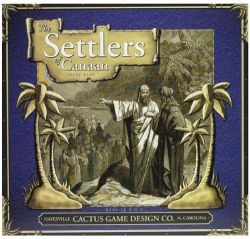Beginner's Guide to Settlers of Canaan

Getting started with Settlers of Canaan...
"Settlers of Canaan"" is a Bible themed version of the popular "Settlers of Catan" board game series. I had some trouble playing this game the first few times, so I created this lens to help others who are just getting started.
First Things First!
If you are new to the game, be sure to read the included manual entirely. While it is not always clear, it cover's about 95% of what you need to know. So read it if you haven't already (If you have the game), then scroll down.
Game Set-up Questions
One part of the set-up which was unclear in the manual, is the placement of settlements. During the game set-up, in a two player game each player gets 3 settlements and three roads to place on the board. In a four player game each player gets 2 settlements and 2 roads to place. In the rule book on pages 5 and 6, it states that new roads must touch an existing road, settlement or City of the same color. New settlements must connect to at least one road of the same color (though simultaneously could be placed on another player's road, which would threaten its "longest road" status by dividing it at that point.) Also each settlement placed cannot be adjacent to another settlement or city. In other words, all settlements/cities must be separated by one unused intersection.
However, these rules are suspended during game set-up, meaning you can place your initial settlements and roads anywhere on the map, providing the settlements do not border Jerusalem. Each road must touch one settlement, so you are placing two or three settlements with an attached road on the board at the game start. Unlike the rules above, during the initial setup your settlements do not need to be connected to other settlements with roads. You can spread your settlements as far apart as you like.
Production Rolls (How to get resources)
After reading the entire manual multiple times, I just could not figure out if you could collect resources from the hexes bordering your own settlements or cities, when it was not your turn. Although this is unclear in the manual, you can. I had assumed you could only harvest your resources on your own turn, but it turns out everyone playing can collect resources from the hexes bordering their settlements (or cities). So in a two player game between Bob and Sally, Bob can collect resources from his own production rolls, as well as Sally's production rolls. After I figured this out by asking someone who played "Settlers of Catan", the game sped up and became much more fun.
Building Cost Card Confusion
Understanding the point values...
Each player (max of 4 players) gets a Building Cost Card with their assigned Tribe at the top (such as the "Tribe of Asher"). The point values on the right of the card are not really consistent, and caused us some major confusion. The two ways to win the game are to be the first to accumulate 12 victory points, or to have the most victory points when the last Jerusalem stone is placed and the temple is completed. The confusion we had was the victory points you receive for different actions. The Building Cost Card has five sections, which I will explain below.
*Road*: It costs one lumber resource and one stone resource to build a road. The point value on the right of the card says "0 pts. (LONGEST ROAD - 2pts.) This means you don't receive a victory point simply for building a road. However, you do receive two victory points if you have the longest continuous road on the board, and if it is at least 5 sections long. If you were to achieve this, you would receive the "LONGEST ROAD" card and move your Victory Point Marker up two points. If someone else built a road just as long, you would lose the points and the card, and no one would get the card until the tie was broken and again someone had the longest road. The longest road must be continuous, and cannot be broken by another player's city or settlement. If another player built a city or settlement in the line of your road, the road would be considered split, and only the unbroken segments would count.
*Settlement*: Settlements cost one lumber, one stone, one wheat, and one wool resource to build. Since you start the game with two or three settlements (depending on the number of players) you also start the game with as many victory points. In a two player game, you place three settlements and three roads at the beginning of the game, and each player starts at the Victory Point roman numeral III (3), since they have three settlements. In a three or four player game, each player starts with two settlements and two roads, so they start the game at Victory Point roman numeral II (2). I was curious why there was no roman numeral I (1) printed on the board, and it is because no one starts at 1, because they will always start with at least two settlements, which are worth one point each. Each settlement built is worth one victory point, but remember there are only 5 in your color, so only five settlements per player can be built. However they can be upgraded to Cities.
*City*: Cities cost two grain resources and three ore resources to build. You cannot build a new city, you can only upgrade a settlement to a city, so when you build it you replace the settlement piece with a city piece. The card states that each city is worth two victory points, HOWEVER, since you already received one victory point for the settlement, you only move your marker up one additional victory point per city, since you already received one for the settlement. Cities double your resource production, so instead of receiving one resource card per settlement bordering the numbered hex, you receive two per City bordering the numbered hex.
*Stone for Jerusalem*: Each Jerusalem Stone costs one stone resource and one ore resource. This is the part of the card which is inconsistent. See page 7 of the rulebook for details on how to purchase a stone during the game. The Building Cost Card states that each stone is worth "2 pts. (MOST STONES - 2 pts.) My opinion is that the card should state "0 pts. (MOST STONES - 2 pts.), because just like roads, each individual stone does not earn victory points, only having the most placed in the temple (starting with the first stone). The card leads you to think that each stone earns you 2 points, which does not make sense, since you only need 9 or 10 points to win (after starting with 3 or 2 in the game set-up). This caused us the most confusion during the first few games, but it went much better after that was cleared up. Just a note, the King's Blessing Card, which goes to the player with the most temple stones placed, also provides 2:1 trades for a designated resource, which is a great asset.
*Development Card*: These are basically wild cards, but almost 60% of them are Priest cards. Four of the development cards will give you a victory point outright, and having the most priest cards "played" starting with three, will get you the "Most Priests" card, which is worth two victory points. If another player ties you with played priest cards, the "Most Priests" card is lost and you move back two victory points. The card will be awarded again once the tie is broken. This part of the card has "? pts. (MOST PRIESTS - 2 pts.) printed on it, which is appropriate since there are different point values possible. As I mentioned before, four of the Development cards will give you a victory point immediately, and having the most priest cards played starting with three will get you two points.
Other links about Settlers of Canaan
- Christian Games: Top 5 Bible Board Games
My family and I just love playing board games together, so much in fact we've instituted the famous Family Game Night into our household! However one unique twist we've incorporated in our family night of fun and games is our faith in the Lord!... - Settlers of Catan Board Game
This is about different versions and expansion packs of the Settlers series of games.



